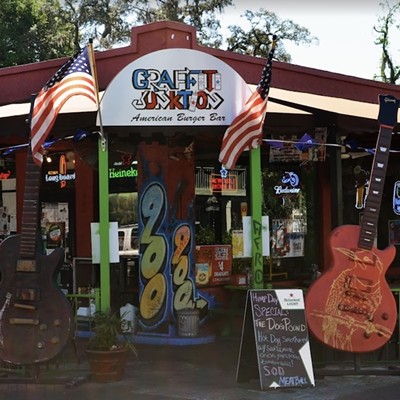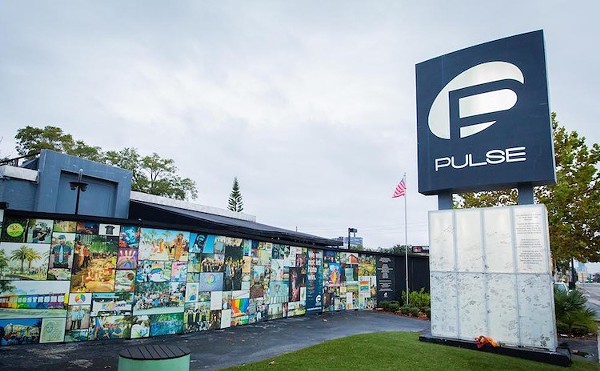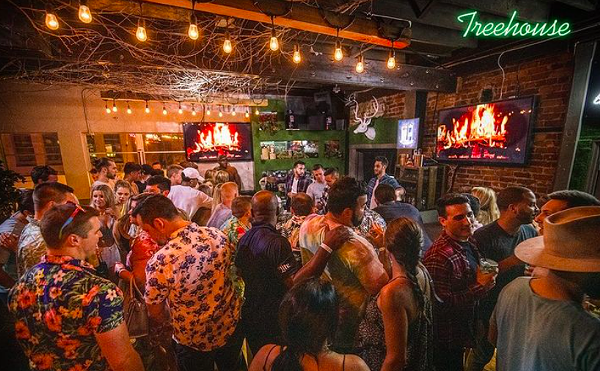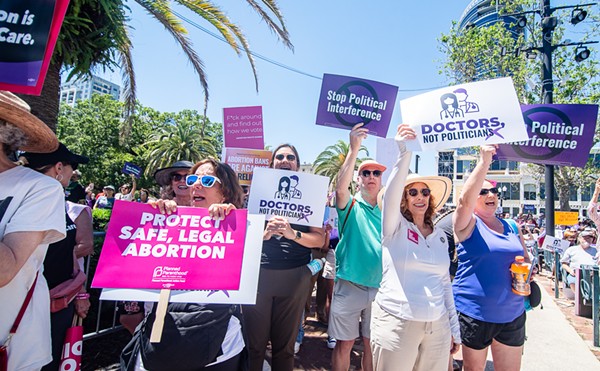“You need to stop lying. I’m not going anywhere, but I really need you to stop lying,” I told Alan, my partner of 11 years, while he sat in a lawn chair in our downtown backyard.
“Would you please just take the dogs and go inside?” was his slurred reply.
It was Easter Sunday, 2012. I had spent the afternoon in Clermont visiting family. When I arrived home, Alan was visibly drunk. His eyes were glazed, and his smile was cocked. He’d been suffering from intense depression and anxiety for a long time, but lately things had been steering toward an abyss.
Still, I didn’t think too much about the exchange. It wasn’t that unusual. I allowed the adrenaline of a drunken squabble to carry me (and the dogs) through the back door and onto a laptop in the back bedroom. I posted a song – a classic Eurythmics antipathy seethe, “Don’t Ask Me Why” – on my Facebook page, anticipating another evening of matrimonial acrimony, soundtracked.
Just as I hit play, at 9:08 p.m., I heard a loud pop, the unmistakable sound of a gunpowder thrust that would change my life forever. The dogs screamed. I jumped up in a panic.
I ran outside to find Alan on his back. His pistol was on the ground about five feet away. There was a gaping hole in his chest. Instinctively, I wrapped my whole body around him, pressing my hand as hard as possible against the wound. Blood rushed through my fingers. I screamed as loud as my constricting throat would allow. Somebody from a neighboring party jumped over my fence and tried to help. I breathed into Alan’s mouth, trying to keep a conversation going all the while.
I could hear him moaning into my ear, but there were no words.
“I love you!” I sobbed. “Please don’t leave me! Please hang on!”
It was only seconds before I had a 911 operator on the phone and the dogs secured. In a few minutes, the police were at my house, yellow crime tape forming a perimeter of doubt. Questions were flying. What happened? Was he breathing? I was pulled out onto the front curb on East Concord Street – left there, listless and on my own, while the paramedics did their best in the backyard. A friend happened to ride by on a scooter; the neighbors came out with bottles of water; the entire Orlando Weekly editorial staff and their respective partners caught wind and began to form a vigil as we awaited the inevitable. I was questioned by an Orlando police officer. My hands were photographed for gunpowder. I was asked to give a statement. I didn’t want to. I didn’t want it to be final.
Also, ironically perhaps, I didn’t want it in the news.
“He was drunk. He’s been sick. He killed himself,” is what I forced out.
“Were you on Orlando’s domestic-partnership registry?” the officer asked.
“No. We hadn’t had the chance.” The registry had only been around for three months.
After three hours, the tape started coming down, and the gurney, with a blanket pulled over Alan’s face, was rolled from the backyard into an ambulance.
“We’re sorry,” the police said. They promised to contact Alan’s family.
I didn’t know what would happen next. I wouldn’t have to wait long to find out.
Within 24 hours, and while Alan’s dried blood was still in my hair, his brother and a family friend were at my house. They quickly set into motion a series of events that, from this one-year distance, seem horrifying, although at the time I was in shock and allowed it all to transpire. They went to the morgue to identify the body, arranged for a local cremation without consulting me, gained access to Alan’s official death certificate, changed his address with the postmaster, promised to get me some ashes, flirted with my girlfriends, walked through the house securing items – computers, financial documents, guns, a chainsaw, a riding lawnmower – that they believed belonged to them, packed up two cars that were registered in my name, took a copy of the Last Will and Testament in which Alan left me everything, and drove off.
It would take an eight-month legal battle (and a nervous breakdown) for me to get back only part of what was rightfully, legally mine.
Though Florida has been making small political strides at the local level with domestic-partnership registries – including those in Orange County and Orlando – the state has historically ignored, or been callous to, the concerns of its gay and lesbian population. In 2008, adding insult to an already existing statute, Florida voters wrote discrimination into the state’s constitution in the form of Amendment 2, a “marriage protection” clause forbidding the state to even consider anything resembling marriage for same-sex couples.
Amendment 2’s proponents swore that it wouldn’t affect domestic-partnership registries: “What is clear is that this [amendment] will not affect domestic partnerships at all,” Florida Family Policy Council President John Stemberger told the Florida Times-Union in 2008. Of course, the Amendment 2 supporters are today leading the charge against Senate Bill 196, which would establish a statewide domestic-partnership registry. Domestic partnerships, they now claim, are too much like marriage and run afoul of Amendment 2.
SB 196 would mirror many of the fundamental rights offered by local registries, including things like hospital visitation, prison visitation and involvement with the educational activities of shared children. It would also implement some modest estate and inheritance protections. It squeaked by the first of five Senate committees on April 1 with a 5-4 vote, over conservative arguments that gays could achieve the same ends with “good estate planning, or at the very least power of attorney,” as Stemberger said recently.
This is simply not true. I’ve been there, and I’ve gone through it. Alan and I had executed all of the estate-planning mechanisms open to gay couples. I even (somewhat smugly) recorded the process we went through in these pages six years ago [“Keep your matrimony, I’ve got mantrimony,” Oct. 4, 2007]. But as I’ve discovered over the past year, you can’t write yourself into fairness with a notary and some boilerplate documents. These stopgaps don’t add up to real protection, and the undue burden of legal fees and paper chases is patently unfair.
As prior generations learned in other contexts, separate but equal isn’t.
In the abstract, I could comfort myself with the knowledge that time is on my side, that in a generation or two, those who’ve deemed my love for Alan less worthy of legal standing than different-sex relationships will have ended up on the wrong side of history. But here and now, laws have consequences. I lived those consequences, and I struggle to find any comfort.
Nobody likes to talk about death – how ugly it is, how it doesn’t comport with the common parlance of love and life – but given the inherent unfairness that I and countless others have faced, I need to.
I met Alan on Super Bowl Sunday in January 2001 at the corner of the pool bar at the Parliament House. He commented on my eyes, then on his own. “Who do you think has prettier eyes?” he joked. He was a charmer who looked like a black-and-white film star and talked like John Wayne. We started holding hands under the bar after talking for two hours.
After a year of playfully awkward courtship, in May 2002, we moved in together downtown. We shared the bills and opened joint accounts. We formed a life together, having friends around for backyard parties, allowing our outwardly opposing personalities to form a broader united front of happiness.
We were the most conventional of unconventional couples, fighting the normal fights about politics and money, but boosters for each other nonetheless. It was Alan who insisted that I run for interim mayor of Orlando in 2005. He was my campaign treasurer, my coach, my biggest fan.
We used to talk about retiring in Costa Rica – at one point we even put some money down on land there – and we would regularly head to New Orleans so that he could gamble and I could drink (Alan, for most of our relationship, did not drink). But mostly, we lived a quiet life, watching Britcoms on Saturday nights and taking afternoon naps. We were incredibly happy.
On holidays, my family would occasionally visit and take us out to dinner; they seemed to like Alan more than me, really. I always tried to pressure Alan into introducing me to his family in Georgia. But, for reasons likely to do with my gender and his shame – he told me once that he’d undergone reparative therapy to “cure” him of being gay at some point in his childhood – it wasn’t feasible, and I relented. Alan loved his mother deeply. He didn’t want to hurt her. I hated being thought of as something that could hurt her just by existing, but life isn’t always what we want it to be. So he would continue to live a double life.
In 2006, Alan’s prolonged health woes became too much for his heavy work schedule, and he opted for long-term disability. I helped him through the process, and even signed the documents to be his caretaker. He wasn’t outwardly ill, just prone to dizziness and exhaustion, probably from the medication he was taking for a chronic illness. That same year, his father passed. Alan made the decision – against my pleading – to split his time between taking care of his elderly mother in Georgia and being taken care of by me. He would also handle operations, albeit silently, for the family’s textile business. It was a ridiculous juggling act, but likewise a noble one.
In September 2007, I suggested that Alan and I get “married,” or at least as married as we legally could under Florida law. There was too much up in the air at that point, between his family (to whom I was a nobody), the coming Amendment 2 debate and his health. He balked a bit at first, but eventually cottoned to the idea.
There were tense discussions about whether I was going to leave him and whether this was a sort of pre-nuptial arrangement, but little talk about what it would all mean with regard to his family’s business should he pass away. I never even thought about it. After meeting with an attorney, we settled on downloading the forms and having them executed by a legal friend. There was the will (which left everything to me and him, respectively), the living will, power of attorney, health care power of attorney, the pre-need declaration of guardian, and a partnership that stated that, in the event of a breakup, we would each get half of the property we were currently sharing.
We were contractually bound.
By 2011, Alan had taken a turn for the worse. Advanced disease and mental-health issues were clearly colliding. I attempted to police his behavior, which now included surreptitious drinking and, on occasion, disappearing. At one point, he fired a gun in the house while threatening suicide, shooting a hole in the kitchen floor. He immediately apologized and tried to smooth things over. We went on a trip to London, one we had wanted to take for a decade, and while we were there, he disappeared into the night, turning up beaten and bruised 12 hours later after being mugged. Our bank accounts were then emptied. He held a gun to his head in his car, and I had him involuntarily committed under the Baker Act. The episodes mounted, with many nights spent pulling him out of gay bars from which he was too inebriated to exit on his own. I broke ranks and reached out to Alan’s brother and mother, and all I got was dead air and disinterest. What, Alan has a boyfriend?
That year, Alan suffered two heart attacks and started monthly visits to the Mayo Clinic in Jacksonville. I began seeing a grief therapist who suggested that I might be suffering from post-traumatic stress. She also, after meeting with Alan, awakened me to the fact that he was dying. He loved me, but he was dying.
In a last-ditch effort, Alan tried to settle his accounts, moving all of the cars into my name and taking his name off of our joint bank account. He tried to obtain a lifetime payout from his disability provider so he could pay off the house and transfer it into my name. He wanted what was best for me.
On April 5, 2012, Alan surprised me with what he called an early birthday present: two commitment rings to replace the “wedding” ring that I had lost two years before. “Love” was printed around the band of one, with “I love you” inscribed on the other. In sickness and in health, in good times and in bad.
My 40th birthday would come in May.
He wouldn’t be there.
On April 18, with the help of numerous friends who gathered with flowers and food and well wishes in the aftermath of Alan’s death, I managed to throw a memorial service for Alan at the Abbey in Thornton Park. I’d received a FedEx package with a bag of Alan’s ashes the day before, and placed them in an urn. I created a PowerPoint of images, a playlist of songs, and took to the stage in a shattered state to sputter kindnesses and tears to an audience of more than 100, from politicians to co-workers to fellow journalists to friends and acquaintances.
That night, attorney and LGBT activist Mary Meeks offered her services should I need them. We agreed to meet the next day. I arrived at her office, stack of estate documents in hand. She pulled the top sheet off – a copy of the will, which, as the sole beneficiary named in that document, I would need to file in court – and explained that this was the only document that mattered. Everything else died when Alan did.
Things were about to get messy. Though I had given Alan’s brother a copy of the will – in which he left everything to me – and though I’d received vague assurances that I’d be taken care of, I discovered that Alan’s family had filed probate with the Orange County Court on April 16, eight days after his death, naming Alan’s mother as both the personal representative and sole beneficiary of his estate. The family’s attorney later emailed Meeks that she had not seen a will, so the family would be required to file as next of kin. It was as if I didn’t exist – or at least Alan’s will didn’t.
After Meeks dispatched an angry email to the family’s Florida attorney, promising that neither she nor the local LGBT legal community would let me get railroaded, the family acknowledged the will’s existence. This was the beginning, not the end.
The initial probate declaration was reversed, and I was declared the personal representative for Alan’s estate. We got a court order to have the items that were removed from the house returned. Figuring out exactly what those items were was no easy feat, considering that I’d been completely oblivious at the time they were taken. I knew about the cars, the computers, some paperwork, tools from the garage and the mower. I didn’t ask them to return our dog, Ferdinand, who they’d also taken the day they showed up at my house; I gave him up as a gesture of kindness to Alan’s mother, as Ferdinand always traveled with Alan back and forth to Georgia.
After several sternly worded reminders, the family sent most of the items back on a hauler and promised the rest would come back in boxes from the family’s attorney. Not everything was returned – there were definitely some power tools missing – but it was too exhausting to nitpick.
Though the family had agreed not to contest the will, within a few weeks things became acrimonious anyway. Accusations began to fly. The family claimed that Alan, who wasn’t there to defend himself, had removed valuables from a safe-deposit box and misspent his mother’s and the company’s money, funneling some of it to me. All of these claims were dubious at best, and the last was easily rebuffed by an examination of my bank account. The most difficult to digest was the suggestion that the family might go after the rings on my finger. I felt like a discarded mistress.
It was clear that the family had no intention of granting me access to the quarter of the family’s multimillion-dollar estate to which I was entitled as Alan’s beneficiary (which I would have automatically received were I his lawful spouse). In truth, I didn’t feel comfortable going after the Georgia assets. They had nothing to do with me.
In the end, after months of posturing and thousands of dollars in legal fees – and an eventual psychological breakdown that ended with me institutionalized for a week – we reached a settlement. I would sign away my rights to the Georgia assets if the family would back off on the Florida probate, and agree to not file any claims against the estate or make allegations about Alan’s behavior.
It was ridiculous, really. The “estate,” at least in Florida, was worth next to nothing; the house was underwater. I had fought for eight months to secure Alan’s dignity and a few thousand dollars. On Dec. 19, the Florida probate case was closed.
A statewide domestic-partnership registry, Meeks told me, would have changed all of this. I could have called the cops when Alan’s brother came to rifle through my things. I would have had control over Alan’s remains. And with a registry – and especially if I was covered under the 1,138 legal rights afforded to married couples – I would have directly inherited the house, thereby obviating the need for court filings and legal fees. I wouldn’t even have needed the will.
“It would have completely put the burden on [the family] to have to come up with valid legal claims to go against you,” Meeks says. “Those bogus claims that Alan was misspending money would have been completely irrelevant. Anything that he owned would be yours.”
On Feb. 19, the Senate’s Committee on Children, Families and Elder Affairs tabled the original version of the SB 196, which included broad legal protections and estate rights for domestic partners. It was, detractors claimed, too close to approximating marriage rights, and, in the words of state Sen. Nancy Detert, R-Venice, a “walking lawsuit.”
“People who stood up for the rights of Floridians are going to be seen as pioneers,” Sen. Jeff Clemens, D-Lake Worth, said in exasperation. “And it’s almost shameful that we have to be viewed as pioneers, ’cause I don’t see myself as one. And I know the other people who support this bill don’t see themselves as pioneers either. This is simply a bill that allows our constituents to be themselves and puts an end to, really, the bigotry that seems to happen in our communities, when somebody who loves someone else can’t act on that.”
Detert and several of the committee’s Republicans indicated that they might support more watered-down legislation.
So Meeks and Equality Florida began redrafting the legislation with state Sen. Eleanor Sobel, D-Hollywood, who has sponsored a domestic-partnership bill each of the last five legislative sessions. This year marked the first time she’s even received a hearing. The new proposal mirrored the domestic-partnership ordinances that exist in some cities and counties, like Orlando and Orange County.
A new hearing was scheduled for March 12. I was asked to testify. So, too, was Janice Langbehn, who had flown in from Washington State. In 2007, while vacationing in Florida with her partner, Lisa, and their kids, Lisa collapsed and was rushed to the hospital with a brain aneurysm. She was declared brain-dead. Despite having a durable power of attorney and living will, Langbehn and the kids were not allowed into Lisa’s room – at least not until Lisa’s sister arrived and arranged for a 10-minute visit. Langbehn sued the hospital, but the case was dismissed. Her story led President Barack Obama to sign an executive order requiring federally funded hospitals to allow visitation by domestic partners. Without a registry, however, enforcement is moot.
I arrived in Tallahassee that morning, testimony in hand. While at lunch, I received a text message from Meeks’ wife (they legally married in another state), Vicki Nantz. There was a problem. State Sen. Geraldine Thompson, D-Orlando, a key supporter, had fallen ill. I rushed to the Capitol to convene with Equality Florida.
We assembled in the committee room. There was still hope that Thompson might show, if only briefly, to cast her vote, but behind the scenes the word was that “we didn’t have the votes,” regardless. Right at 2 p.m., Sobel announced that the bill was postponed again. (“If you don’t have the votes, you don’t have a bill,” I overheard her say while waiting for the elevator.)
Outside in the lobby, John Stemberger beamed. He had “defeated” the bill, he boasted.
The committee eventually rescheduled the hearing for April 1, and Meeks asked me to email my written testimony to the committee’s senators. A few hours before the hearing, Equality Florida published my remarks, which spread rapidly across the Internet. In the end, the bill passed 5-4, though SB 196 probably won’t make it through its four other assigned committees by the end of this session.
It was a symbolic victory for equality, though – one that I was proud to play a small part in. It’s been a year of small victories, after all.
There’s a part of me that wishes I’d been able to look them in the eyes and tell them in person – to tell the entire legislature, as well as those who would diminish my relationship with Alan because of their ignorance or bigotry or religion – how incredibly fortunate I’d been.
See, I knew my rights and had attorneys looking out for me. But since Alan died, I’ve spoken with several members of the LGBT community who, when their partner died, lost everything. And that could have been me. My name wasn’t on the deed to the house Alan and I lived in. I didn’t have a right to anything in Alan’s name – our savings, his inheritance, not even our cars. I could have been homeless and destitute. And even with all these advantages, I still forfeited some of what I was entitled to because the fighting was just too hard.
This bill, even as small a step as it is, would fix that. It can save people from suffering what I went through during the worst time of my life.
We need to stop lying to ourselves.


















